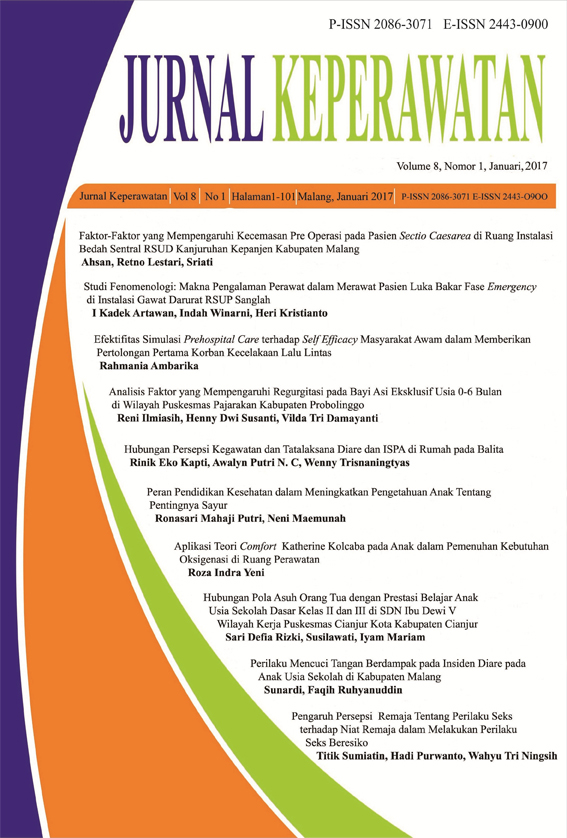Relationship between Parenting Style and Children Academic Achievement among Elementary Students Grade II and III
DOI:
https://doi.org/10.22219/jk.v8i1.4020Keywords:
Parenting style, academic achievement, elementaryAbstract
HUBUNGAN POLA ASUH ORANG TUA DENGAN PRESTASI BELAJAR
ANAK USIA SEKOLAH DASAR KELAS II DAN III
Relationship between Parenting Style and Children Academic Achievement
among Elementary Students Grade II and III
Sari Defia Rizki1, Susilawati2, Iyam Mariam3
123Sekolah Tinggi Ilmu Kesehatan Sukabumi
Jalan Karamat Nomor 36, Karamat, Kec. Sukabumi, Kota Sukabumi,Jawa Barat 43122
1e-mail: saridefia@ymail.com
ABSTRAK
Pola asuh merupakan cara yang digunakan orang tua dalam mencoba berbagai strategi untuk
mendorong anak mencapai tujuan yang diinginkan.Pola asuh merupakan pencerminan tingkah laku
orang tua yang diterapkan kepada anak.Hal tersebut berpengaruh terhadap prestasi belajar di
sekolah, terutama pada anak usia Sekolah Dasar.Penelitian ini bertujuan untuk mengetahui
hubungan pola asuh orang tua dengan prestasi belajar anak. Penelitian ini menggunakan jenis
penelitian korelasional melalui pendekatan crossectional. Sampel dalam penelitian ini adalah ibu
yang memiliki anak usia sekolah dasar kelas II dan III di SDN Ibu Dewi V sebanyak 98 ibu
dengan teknik pengambilan aksidental sampling.Hasil penelitian menunjukan bahwa sebagian
besar orang tua melakukan pola asuh demokratis 35%, gabungan 28%, permisif 19% dan otoriter
18%, sedangkan untuk prestasi belajar anak baik sekali 37%, baik 48%, dan cukup 15%. Analisa
hipotesis menggunakanChi Square p-value 0,011.Hasil penelitian menunjukan ada hubungan
antara pola asuh orang tua dengan prestasi belajar anak. Maka disarankan kepada Puskesmas
Cianjur Kota untuk meningkatkan pembinaan bagi pihak sekolah tentang pola asuh yang baik dan
kepada SDN Ibu dewi V diharapkan dapat melakukan konseling dengan orang tua agar
menentukan pola asuh yang baik.
Kata kunci: Pola asuh, prestasi belajar, sekolah dasar.
ABSTRACT
Parenting is the way in which parents in trying various strategies to encourage children to achieve
the desired objectives. Parenting is a reflection of the behavior of parents who applied to children.
This effect on learning achievement in schools, especially at primary school age children.This
study aims to determine the relationship of parenting parents with learning achievement of
children. This research uses a correlational study with cross sectional approach. The sample in
this study were mothers who have children of primary school age class II and III in SDN Ibu Dewi
V with 98 mothers taking technique accidental sampling.The results showed that most parents do
democratic upbringing 35%, a combined 28%, 19% permissive and authoritarian 18% while for
the learning achievement of children excellent 37%, good 48%, and as little as 15%. Chi Square
analysis menggunaka hypothesis p-value of 0.011. The results showed no relationship between
parenting parents with learning achievement of children. It is advisable to Cianjur City Health
Center to improve guidance for the school to be on good parenting and the mother goddess V SDN
expected to do counseling with parents to determine good parenting.
Keywords: Parenting style, academic achievement, elementary
Downloads
Downloads
Published
Issue
Section
License
Authors who publish with this journal agree to the following terms:
- Authors retain copyright and grant the journal right of first publication with the work simultaneously licensed under a Creative Commons Attribution-ShareAlike 4.0 International License that allows others to share the work with an acknowledgment of the work's authorship and initial publication in this journal.
- Authors are able to enter into separate, additional contractual arrangements for the non-exclusive distribution of the journal's published version of the work (e.g., post it to an institutional repository or publish it in a book), with an acknowledgment of its initial publication in this journal.
- Authors are permitted and encouraged to post their work online (e.g., in institutional repositories or on their website) prior to and during the submission process, as it can lead to productive exchanges, as well as earlier and greater citation of published work (See The Effect of Open Access).

This journal is licensed under the a Creative Commons Attribution-ShareAlike 4.0 International License.














